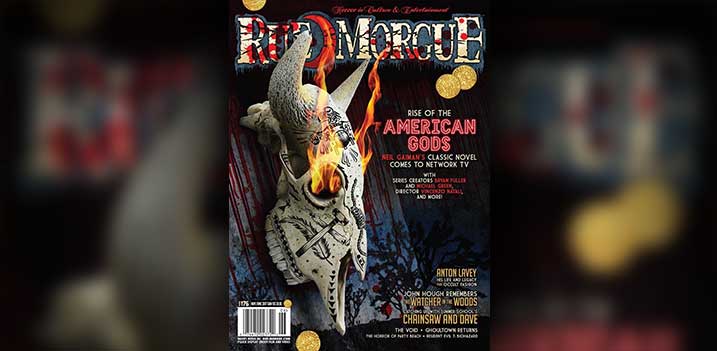

Full Disclosure: The Church of Satan, and the paradox of individualist religion
The Church of Satan (as an organization) has been very apolitical (from what I can tell), and I know you (Gilmore) have written about your distaste for PR stunts. What about individuals who want to be political activists, who refer to Satanism as their motivation? Is that something that is "within bounds" according to the basic tenets of the Church of Satan? Or does such activism in the name of Satanism go against core principles of the religion?
The Church of Satan is not like organizations claiming to serve as the voice for a collective. Uniquely, we are an association of individuals who uphold (as a basic premise) our members’ responsibility to create their own self-determined hierarchy of values regarding what they find beneficial or harmful in their lives. Political issues are thus the province of each member and we’ve noticed that choices beyond embracing the fundamental tenets of Satanism can be widely divergent amongst them. Thus, by design, the Church of Satan may not claim to speak or act for all of its members on political topics. It is not a collective, but instead a cabal of many with diverse pursuits, and so to understand it one must observe the doings of its members. That is difficult since many are not open about their affiliation so, like an iceberg, only a small percentage is publicly visible, as was mandated by our founder.
We have numerous members who are activists in various spheres that they find to be of personal interest and benefit. Satanism empowers Satanists to be the center of their own subjective universe, their own “gods” so to speak, so it is their personal values and desires motivating their activism or any other pursuits, not Satanism itself. It is important to note that Satanism is not a cause, rather it is a set of principles that serve as a tool for each Satanist to get the most out of life. So “activism in the name of Satanism” is meaningless, since there is nothing that can stop one from employing the principles of Satanism as a personal tool for survival and prosperity. The fundamental concepts of Satanism support the individual Satanist’s desire to be politically active towards goals that enhance his or her values.
One could easily find it wise not to be open about one’s adherence to Satanism since that could hinder one’s goals if the people needed to attain them would be motivated to act against the “out” Satanist’s interests. The choice is up to each of our members as to what would best serve their needs, but martyring oneself using Satanism as a cause is utterly against our principles—unless someone finds such masochism to be personally fulfilling. You’ll find many of our open members’ projects on our news feed. We have quite a few “under cover” members and certainly the Satanist CEO would often consider discretion the better part of personal achievement.
Activist Satanists work through appropriate channels to forward their objectives, often keeping their affiliation secret since it could easily serve as a stumbling block when dealing with a diverse group of non-Satanists who share with them a common political goal. Numbers of people behind an issue is often a crucial factor and so the Satanist does not alienate others who might be supportive if truthfully maintaining their atheism rather than explicitly declaring their Satanism works better. Some of our members can be found supporting preservation of endangered species or other animal rights pursuits and their affiliation may not be pertinent towards convincing others as to the values of their efforts, so it may be hidden. Each end requires evaluation as to what would be the most successful means.
While mentioning Satanism outspokenly may draw much attention, we’ve yet to see any actual results achieved beyond flash-in-the-pan publicity and misrepresentation of the philosophy and practices of Satanism when those outside the Church of Satan have taken that approach. Many of our activist members support secularist/atheist organizations whose efforts at litigation against existing legislation are consistent with all of their stated principles/philosophy and thus more likely to win judicial decisions that can curb theists from forcing their beliefs on those who want no part of them. Victory has been achieved via this method.
Satanism could easily continue to exist even if there were bans on it and in fact our members in nations that are dominated by theocratic governments hide their affiliation from just about everyone so that they can live their lives without being put to death by the tyrannical rulers of their nations of residence. Some work underground towards increasing freedom for their countrymen, and take that risk by choice. Others find ways and means to exit such nations, or to remain and prosper. Satanism supports the option to decide what best suits their personal values.
Do the core beliefs and principles of the Church of Satan have any implications for "separation of church and state", or legal constructs such as the "Religious Freedom and Restoration Act"? (To me this is a separate question from the one of political activism: I'm mainly asking as it applies to individuals. In other words: if I am a true believer in the tenets of the Church of Satan, would I agree with the idea of separation of Church and State? Or would I disagree? Or would my belief in Satanism have no bearing on that question at all?)
Our philosophy supports the strict separation of Church and State rather than a competing morass of religious pluralism. Satanism has at times been defined as an “anti-religion” and so in this society it is consistent to support secularism in government. With the plethora of religions in existence it is far wiser to advocate the keeping of them as private among their adherents, not as active elements competing to foster their own interests in the realm of governing a varied citizenry. Secularism over pluralism makes sense, particularly when one is a member of a minority point of view. Thus a republic which attempts equity for all being governed rather than a democracy that can be swayed by majoritarian interests is a sensible environment in which many, including Satanists, can flourish and enjoy their own preferred paths that don’t require intentionally impinging on others. It should be obvious that a theocracy would not be a happy place for any who were not part of the dominant religion.
The “Religious Freedom and Restoration Act” seems to me to be a nebulous bit of legislation whose implications were apparently not fully considered prior to enactment since the original intent (to my knowledge) was basically to allow Native Americans access to areas they considered to be “sacred” owned by the United States Government. The concept that the “Government shall not substantially burden a person’s exercise of religion” leaves as far too vague the interpretation of what that “burden” and the limits of an “exercise of religion” might be. The Hobby Lobby approach and that of the religious leaders who wrote on July 1, 2014 to President Obama—suggesting that being forced to treat people they hire with equality is a substantial burden—essentially both seek to allow discrimination against those who do not share their beliefs who are employees of primarily non-religious business endeavors. I’ve addressed that absurd issue here.
So this act has left loopholes which Christians are now using as a means for forcing others to follow their beliefs as well as for punishing others who are non-believers. I suspect this interpretation goes beyond what the framers of the original legislation intended and so it is time for a re-evaluation and fine-tuning of this towards the end of equity for all involved. President Obama’s rejection of that letter’s anti-LGBT request was a fine counter-move. It can be difficult to reach consensus when one side considers “freedom” to consist of curtailing the pursuits of others that are not personally forced upon them. In a free society, which is advocated by most Satanists, we cannot guarantee that one will be free from being offended by the diverse legal indulgences of others.
Can you imagine any type of political or cultural scenario where the Church of Satan would publicly support or oppose a law, politician, or movement? (I know this calls for free speculation and if you'd rather not answer I understand.)
Back during “The Satanic Panic” (80s-90s) there was proposed congressional legislation to make Satanism illegal. During that time Anton Szandor LaVey, the founder of the Church of Satan, had encouraged me as a spokesperson for the organization and the means for combatting this proposal was to educate people about what Satanism really was, rather than the, then current, fantasy of Devil worship, child abuse and sacrifice promulgated by evangelical Christians and gullible journalists. LaVey did not have the Church of Satan issue statements rallying its members to sally forth. Instead, he felt that fulfilling the purpose of the Church of Satan—educating others as to what it represents—would serve to dissolve the false definition of Satanism fueling that proposed law. And so it did and I spent many hours accurately representing the reality of our philosophy in all forms of the media to that end.
It is my practice to continually write pieces demonstrating how Satanism can be applied towards many different aspects of life and society beyond what Dr. LaVey covered in his works, and in doing so I maintain the rational, coherent set of principles that he originated. I comment on issues that arise in which Satanism is being raised, often falsely, so situations such as the Columbine murders, The West Memphis Three trial, various slayings and other crimes deemed by journalists or local authorities to be “Satanic” have been and continue to be addressed. I also point out where theism is attempting to quash secularism in our society, and the same-sex marriage issue—one of civil rights being abrogated because of theist concepts—has received a number of essays.
Since the primary purpose of the Church of Satan is education, I and the rest of our articulate spokespersons address questions via our on line presence as well as through interviews in all media, including numerous podcasts. Our regular lectures at colleges and other educational institutions have been successful for years, and we’ve also served the needs of our members through baptisms, weddings and funerals as well as private events. These are not intended for public consumption beyond specific audiences and so fulfill their intended purposes without outside knowledge or interference.
If a law, politician, or movement arose that was directly and specifically hostile to the members of the Church of Satan, I would determine, considering the factors involved, what might be the most advantageous course of action towards resisting such efforts.
Finally, I just want to make sure I get my terminology correct: The Church of Satan ascribes to "Atheistic Satanism", and the notion of "Atheistic Satanism" draws its roots back to Anton LaVey. Is that right? If not please let me know the correct way to refer to the religion espoused by the Church of Satan, and how it can be differentiated (in terms of labels) from other "branches" or groups out there who also sometimes use the term "Satanism".
We define our approach simply as “Satanism” since no coherent philosophy named such existed in an organized and widely disseminated manner before Anton LaVey’s founding of the Church of Satan. Satanism had been an epithet hurled as a means to denigrate people throughout history prior to LaVey. While Maria de Naglowska and and Stanislaw Przybyszewski embraced Satan as a positive symbol in their lives (much to the consternation of their associates) they did not spawn global movements with fully codified philosophies. LaVey defined Satanism as based on atheism and I’ve pointed out the conceptual journey that leads one from basic non-belief in deities to what I call I-theism in my essay “What, The Devil?”.
We do not accept others using the term Satanism and instead challenge them to clearly define what they are doing in contradistinction to the Church of Satan through descriptive nomenclature. The theistic organization The Temple of Set, created by departing members of the Church of Satan headed by Michael Aquino, was self-termed Setianism and it is the only left-hand path organization with an actual belief in supernatural deity figures with a philosophy that is clearly delineated in a body of literature. We consider those who believe in any supernatural demonic entities to be devil worshippers or demonolators, not Satanists. We’ve yet to see any other group calling itself Satanist that has a philosophy that is defined beyond simply cribbing from Church of Satan’s literature mixed with incongruous added personal agendas.
Over the past nearly fifty years, the Church of Satan has produced a philosophical perspective that serves many around the globe as a means for enhancing their lives using a rational and coherent set of principles. Whatever else may arise, I think what we offer will continue to have value for a select few outside of the herd of society who are intelligent, creative, skeptical and—most of all—carnal and willing to take up the challenge of determining their own personal standards and living up to same.
—Magus Peter H. Gilmore
Here is the published blog: The Church of Satan, and the paradox of individualist religion by Greg Stevens

Portrait

Peter H. Gilmore
High Priest of the Church of Satan
We Are Legion
A Moment In Time
This slideshow requires JavaScript.
SUPPORT THE
CHURCH OF SATAN!
There are many ways you can support the Church of Satan. Visit our support page to learn how.
navigation-topper


